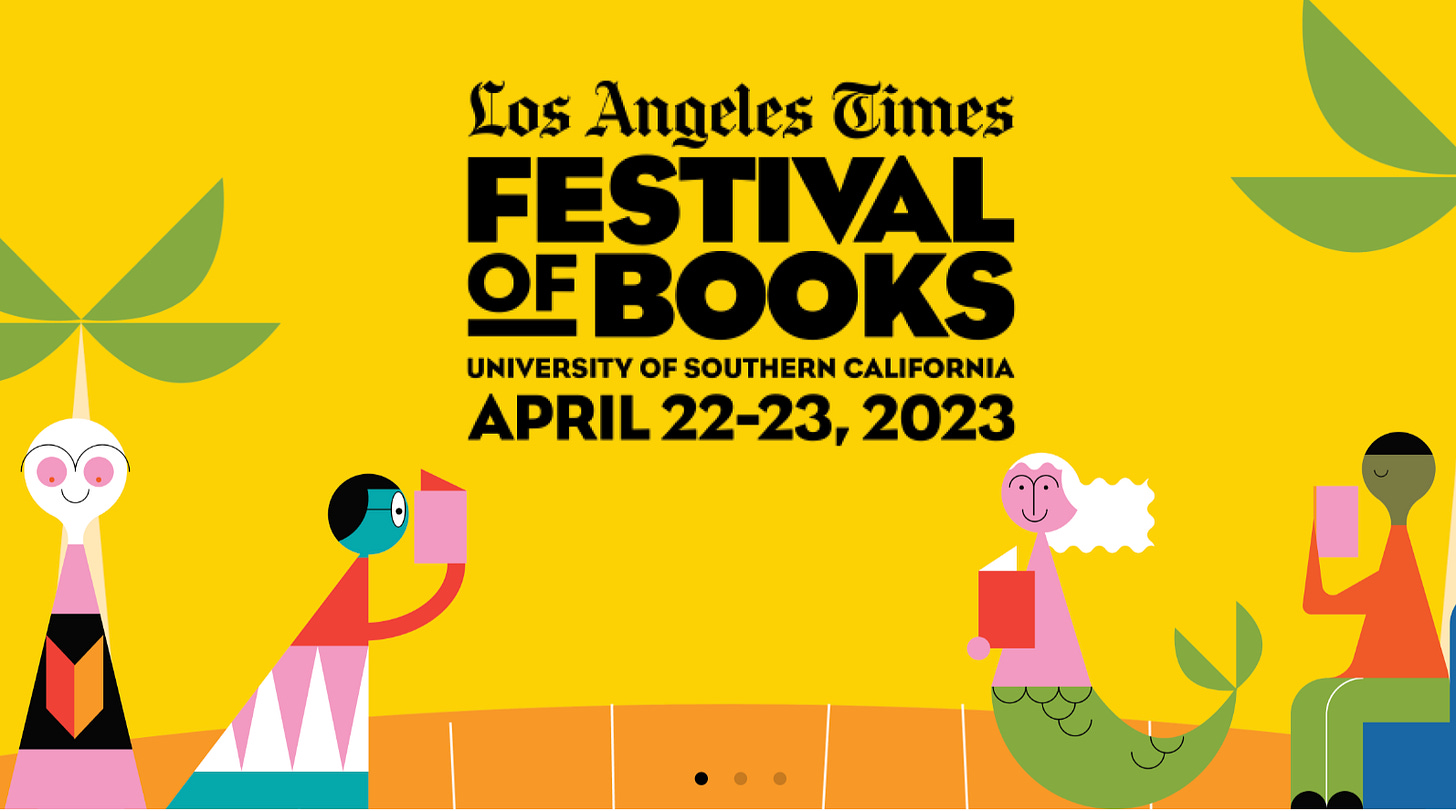This past weekend I attended the Los Angeles Times Festival of Books. It’s billed as the country’s largest annual literary festival and usually takes place during an April or May weekend on the University of Southern California’s main campus. I’ve attended several times—twice as a spectator, three times as a panelist, and once as a finalist for the first-fiction book prize.
This year I attended a panel moderated by Boris Kachka (the L.A. Times’ book critic) of highly accomplished novelists that included Andrew Sean Greer, Rebecca Makkai, Adam Sternberg, and Elizabeth McKenzie (her new novel, The Dog of the North is so fresh, funny, and poignant—an interview with her is forthcoming!)
There were at least 120 people in the audience, and the panelists were eloquent and often very funny. It was clear from the enthusiasm of the attendees that despite the strident, periodic claims of the novel’s imminent death, there are still plenty of readers who will be on hand to resuscitate it if it ever truly is in peril.
Perhaps my favorite moment was when in response to an audience member’s question, “When you were very young, did you already know you wanted to be a writer?” Elizabeth revealed that she had started a newsletter in childhood titled “Stomachs Digest.”
I left the book festival feeling lighthearted—books were alive and well—and so were their readers! I also felt relief to be on my way home because prior to the event I had experienced some wallflower-like feelings. I’d applied to take part in the festival, filling out an application form for each of the two books I published last October—Please Be Advised: A Novel in Memos, and a short fiction anthology I edited, Love in the Time of Time’s Up. I never received a reply of yea or nay and therefore didn’t know until I saw the publicity emails for the festival that panelists had been chosen.
The lack of response sent a message that I interpreted (unhelpfully) as, “Who are you?” The previous panels I participated in had been pitched by Bloomsbury, a Big Five publisher, or else tied to the book prize nomination. It’s not easy to make the cut, but I was nonetheless disappointed.
The daily struggle to be seen, which is basically the same, I think, as the struggle to be loved, requires a lot of energy. It’s one of the more challenging aspects—if not the most challenging—for people attempting to make a life in a creative profession. (Probably the same is true for any profession.)
This past January, a much-discussed and shared essay by Benjamin Schaefer was published in Electric Literature, “We Need To Talk About Professional Jealousy.” Schaefer’s thesis is this: what many writers actually feel is disappointment in their own achievements rather than jealousy of another writer’s success, especially a peer’s.
As someone who has been both the focus of at least a couple of other writers’ envy (they’ve bravely admitted as much to me), and prey to those feelings myself, I was moved by Schaefer’s essay and his willingness to examine his struggles with his feelings about peer accomplishments and his disappointment over what he perceives to be his inability (so far) to match their career trajectories.
This subject has long interested me, as it likely does anyone prone to examining their emotional landscape from time to time. I wrote an essay a number of years ago for O Magazine about jealousy (which is more about romantic than writing-related jealousy). In it I discussed a couple of ways to manage feelings of inadequacy and envy. One of which is to use others’ successes to motivate yourself to work harder but also to acknowledge that it’s all but impossible to be the best at everything you try to do.
If you’re a writer, over the years you’ve probably suffered more than seems reasonable, whether it’s in relation to your writing goals, a faltering work ethic, a book’s inability to grasp the public’s imagination, or other writers’ success. You’ve likely asked yourself why you’re even bothering to put words on the page if very few people are buying your books—if you’ve managed to publish a book in the first place. I’ve had quite a few of those moments lately.
I cover some of this terrain in an essay I posted here last month, “Eight Years Between Book Sales,” but since publishing that post, I’ve been experiencing more doubts than usual about my career as a fiction writer.
One tactic I’ve tried to employ since I started writing is to try always to take the long view. It isn’t easy, perhaps especially in our insta-culture, which seems increasingly fixated on instant gratification, life hacks, and the myth of the overnight success.
I’ve been writing for more than thirty years, and I feel my previous optimism waxing and waning more often than it used to (emphasis on waning). My domestic partner is in a graduate clinical psychology program presently, and the other day he mentioned a reading assignment that referred to German psychoanalyst Karen Horney and her view that giving up on one’s dreams—if after many years they haven’t come to fruition—is a sign of maturity.
I had to laugh about that. It struck me as a distinctly un-American line of thinking, but also one that I admire. (In college I studied in Strasbourg where at the time I found the French alarmingly unsentimental about a number of things Americans consider sacrosanct, including one’s ability to become an artist, no matter how late in life. The last time I checked, the most prestigious art school in the France didn’t accept applicants older than 24. If you miss that boat, tant pis!)
Some days are better than others, to state the patently obvious. Tangentially, in the last couple of weeks, I’ve thought about some advice offered by Kate McKean in
earlier this year: If someone you can’t stand keeps posting about all the *amazing* things happening to them, mute or unfollow them.And I recalled something else Adam (my forbearing partner) once told me that I took to heart: the people who most frustrate or infuriate us are the ones who teach us the most about ourselves. (I find this very annoying – probably because it’s true.)
I’m pretty sure most writers—*amazing* or not—are walking around, one day to the next, in some state of misery. But at least if you want to go art school in the U.S., it’s okay to be older than 24.
To wrap up what has turned out to be a longer essay than I anticipated, I’ll conclude with something one of the two Zen calendars in our household advises (two! we have a surfeit of haikus, koans, and indecipherable riddles here):
“A path is made by walking on it.” --Zhuangzi





I appreciate your thoughts on waxing and waning—that is the truth of all thing, all seasons pass into the next. I want you to keep writing fiction, selfishly. Why does anyone do anything? For my own writing self I am, for better and/or worse, only answerable to myself. If I ever had any ambition it was beaten out of me long ago and I still write. I feel like this post is you seeing yourself in the middle of the path. All any of us can do is to keep walking.
"Amazing" is my pet peeve! If everything is "amazing," then nothing is "amazing." I tell my students that if they watch one of those dopey shows where celebrities give each other little trophies for being celebrities, down a shot of whiskey every time a winner uses the word "amazing" in their acceptance speech, i.e. "my amazing director/this amazing project/ my amazing cast members/my amazing agent/my amazing family, my amazing etc. etc." Play this drinking game and you'll be dead from alcohol poisoning outside of ten minutes. There are so many more expressive adjectives than all those "amazings." "Amazing" is what I call a "potato chip" word. It amounts to empty calories in your prose. "Amazing" might fill your sentence, but through endless overuse, it's an ineffectual word that says nothing.